Newsletter: Essential Arts: Culture shuts down IRL, materializes online
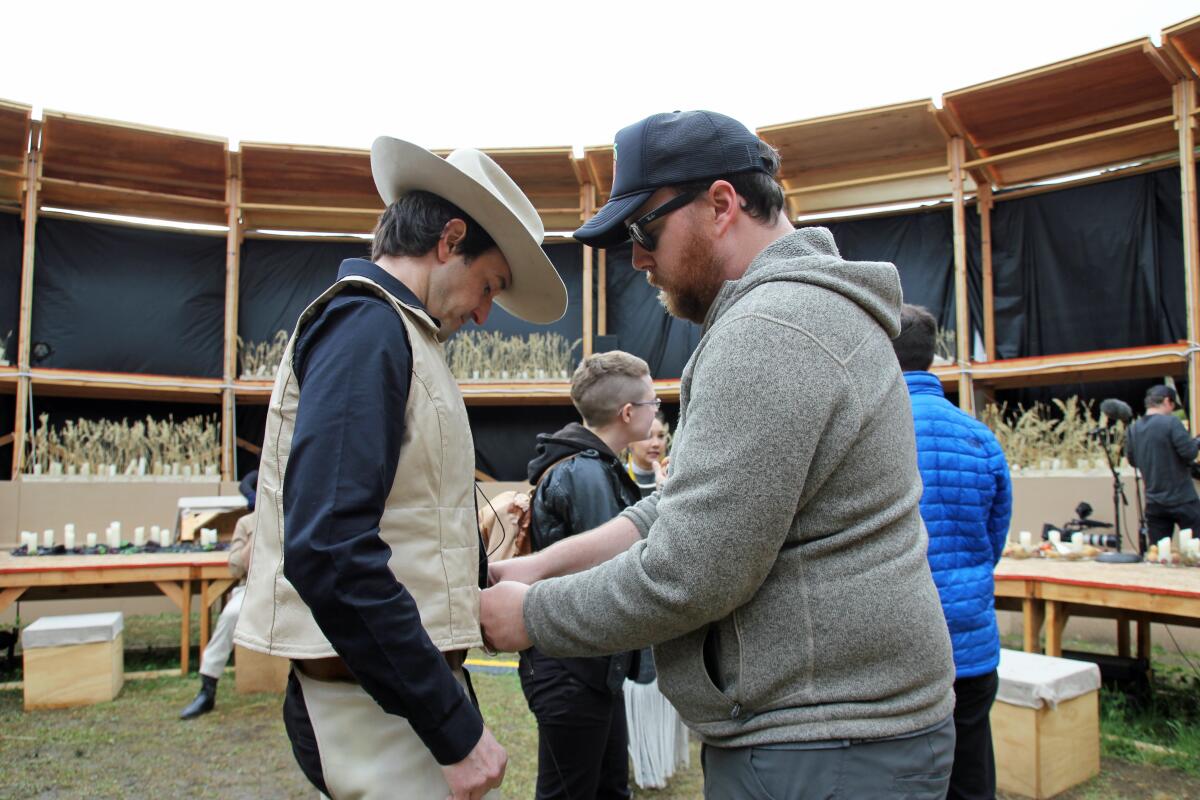
- Share via
Greetings, my fellow quarantinis. I hope you have found good shelter and strong toilet paper supply lines. I’m Carolina A. Miranda, staff writer at the Los Angeles Times, with the week’s essential culture and coronavirus news:
The shutdowns
California has battened down the hatches. The 21 California museums The Times was tracking have all shut down. Performing arts venues are closed. And the virus has also shuttered hundreds of other events.
New York’s Metropolitan Opera announced it would cancel the rest of its season. The Times’ Jessica Gelt reports that while productions at the L.A. Opera are on hold, the season has not been canceled. “We are acutely aware of and sensitive to the financial impact both to the institution at large and our hundreds of artists, artisans and staff members,” said L.A. Opera chief executive Christopher Koelsch.
“Hamilton” at the Pantages has canceled shows through April 19. The hit musical didn’t even have a chance to open before getting shut down by the virus — hours before the production was set to begin.
In New York, Martin McDonagh’s comedy “Hangmen” has canceled its Broadway run, making it the first Broadway production to shut down permanently because of coronavirus.
The Times’ Deborah Vankin surveyed 11 L.A. arts institutions to find out what’s happening with the folks who will be hardest hit by the shutdowns: the box-office attendants, visitor services associates and other part-time and hourly employees. All but one have said they will pay scheduled shifts through the end of March.
ARTnews reports that two weeks ago, a Bonhams employee in L.A. went to work with flu-like symptoms. On Tuesday afternoon, an auction proceeded anyway.
Make the most of L.A.
Get our guide to events and happenings in the SoCal arts scene. In your inbox every Monday and Friday morning.
You may occasionally receive promotional content from the Los Angeles Times.
The Actors’ Equity Assn. has launched a letter-writing campaign to urge that U.S. representatives take emergency action for those working in the theater industry, while the American Alliance of Museums has asked Congress to allot $4 billion for nonprofit museums. And Philip Kennicott has a really good report on how this may affect museums in the long run — and how a version of a pandemic scenario was actually tested by museum leaders in 2008.
Architecture critic Michael Kimmelman looks at what coronavirus means for our urban fabric.
There are some rays of relief: a network of New York philanthropists have come together to form a $75-million fund for New York City arts and social services organizations impacted by the crisis. And the Kinkade Family Foundation has a new emergency grant for curators experiencing “unexpected emergencies” related to COVID-19.
Plus, The Times’ listings coordinator Matt Cooper writes about what it’s like to try write up calendar listings when everything is closed. “Last Wednesday morning, the cancellations began as a trickle,” he writes. “Thursday came the flood.”
Culture goes online
The self quarantines that began even before Gov. Newsom issued a stay-at-home order for California on Thursday has left culture battered, but not down.
The cast and crew of the acclaimed opera “Sweet Land” from Yuval Sharon’s company the Industry got together for one final performance — before empty seats and a trio of video cameras. I sat in on this particularly melancholic show, which the Industry aims to put online next week as an on-demand video (partly to fill the budget gap that the cancellations have left in their budget).
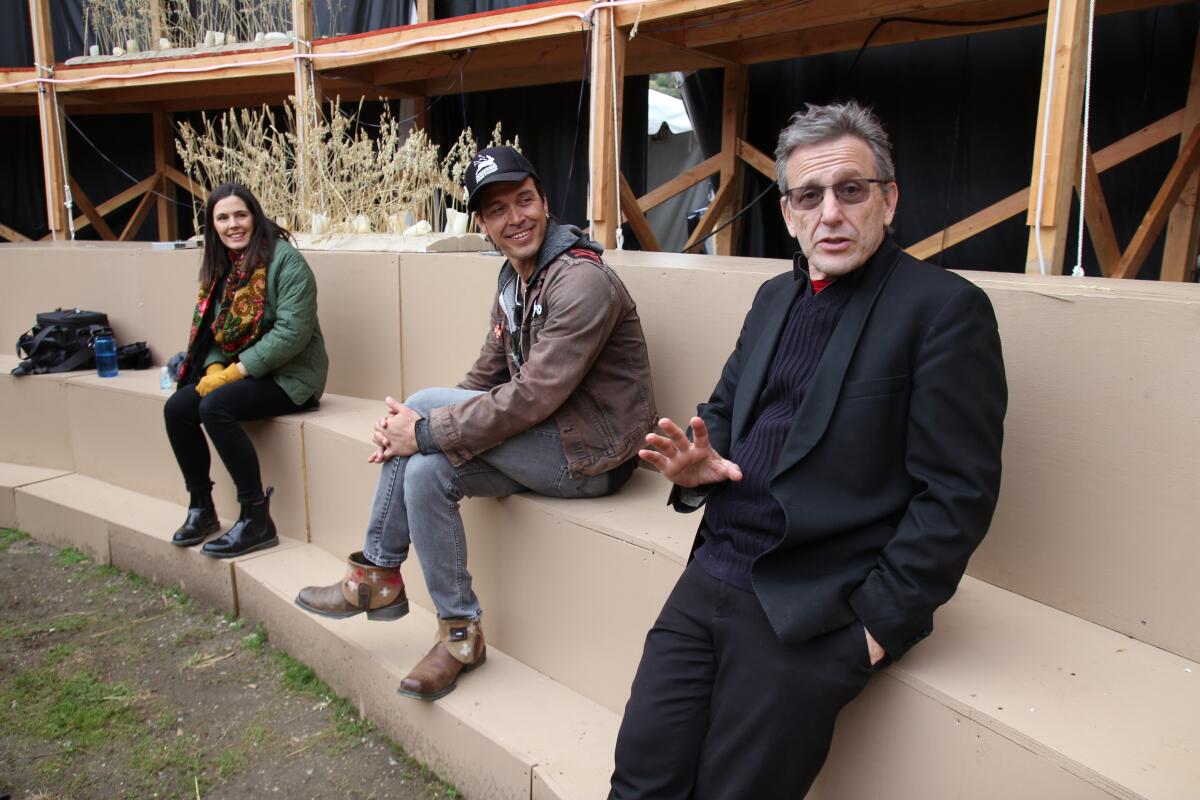
Classical music critic Mark Swed selects the best classical concerts to stream for the coronavirus-rattled soul, featuring Messiaen’s “spiritually effusive” “Trois Petites Liturgies de la Présence Divine” and Jaromir Weinberger’s operetta “Spring Storms.” “It won’t be easy to resist checking your phone while listening or not to have a pit in your stomach knowing that what you’re hearing was then, and this is now,” writes Swed. “But there are compelling reasons to try.”
Swed also watches the first streamed concert by El Sistema, the internationally influential music education program founded in Venezuela, where the coronavirus has also hit. Swed notes that while the program that produced L.A. Phil music director Gustavo Dudamel, now celebrating its 45th anniversary, has been used as a political propaganda tool since Nicolás Maduro’s troubling regime came to power, the performance of Mahler’s Second Symphony by the Simón Bolívar Symphony Orchestra shows the institution’s staying power.
Enjoying this newsletter? Consider subscribing to the Los Angeles Times
Your support helps us deliver the news that matters most. Become a subscriber.
Andrew Lloyd Weber took to the keys — and Twitter — to play “All I Ask of You” from “The Phantom of the Opera.” “Of all the semi-impromptu performances that have erupted on the internet since COVID-19 locked us inside our homes,” writes theater critic Charles McNulty, “Lloyd Webber’s offering is the one that brought me closest to tears.”
Contributor Tom Jacobs rounds up the best theater streaming experiences, including “Red,” which stars Alfred Molina as the painter Mark Rothko, and “Thom Paine (Based on Nothing),” an absurdist drama featuring Rainn Wilson. The “angst and dislocation” of the latter,” writes Jacobs, “should feel very familiar about now.”
Numerous playwrights are leading virtual classes online. “We have the technology to do these things,” playwright Young Jean Lee tells The Times’ Ashley Lee. “We will adapt; we will figure out how to keep going.”
Dance Magazine has a list of performances that have gone online. Do not miss this fantastic socially distant performance by Alvin Ailey’s American Dance Theater.
Jessica Gelt looks at six great online visual art experiences on Google Arts & Culture, which features thousands of high-resolution images from more than 1,200 museums globally — which you can examine down to the brushstroke. Among her recommends: the Van Gogh Museum in Amsterdam, the Uffizi in Florence and the Museo Frida Kahlo in Mexico City.
And Times reporter Daniel Hernandez writes that the North Hollywood gay nightspot Club Cobra is livestreaming drag and go-go shows to raise money for its performers who are unable to dance and lip-sync before live audiences during the coronavirus shutdown.
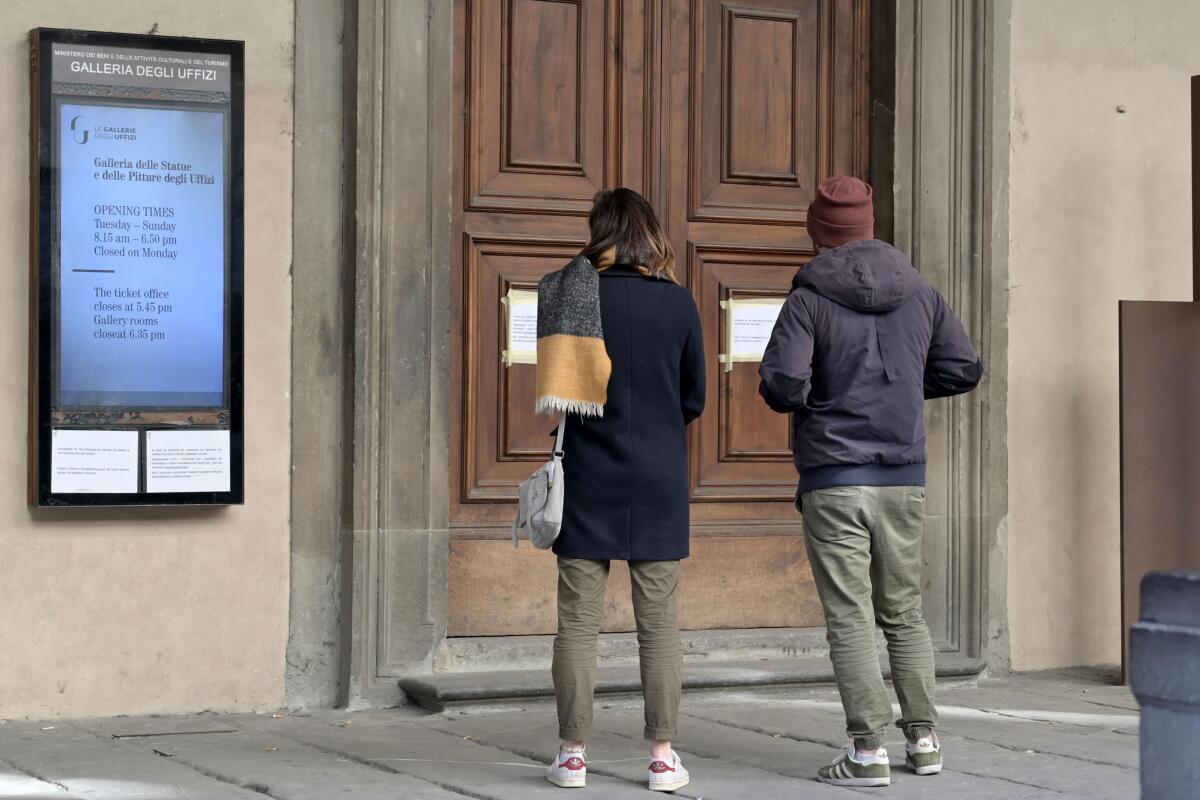
Need more? The Times has a comprehensive guide to entertainment for the quarantine for a special issue of Sunday Calendar, with essays by some of our critics for ways to stay connected even as we are separated at home.
As always, you can find all the latest coronavirus news at latimes.com/coronavirus.
What the critics are up to
With everything closed, they are all finding myriad ways to stay entertained.
Art critic Christopher Knight is reorganizing his library — and stumbling into artful moments. Like the catalog for a show of works by the Italian painter Giorgio de Chirico held at the Museum of Modern Art in 1982. Unearthing the catalog took Knight to the past and brought him back to the present, since Giorgio de Chirico‘s “anxiety-ridden visions of vacant Italian cityscapes” feel very of-the-moment.
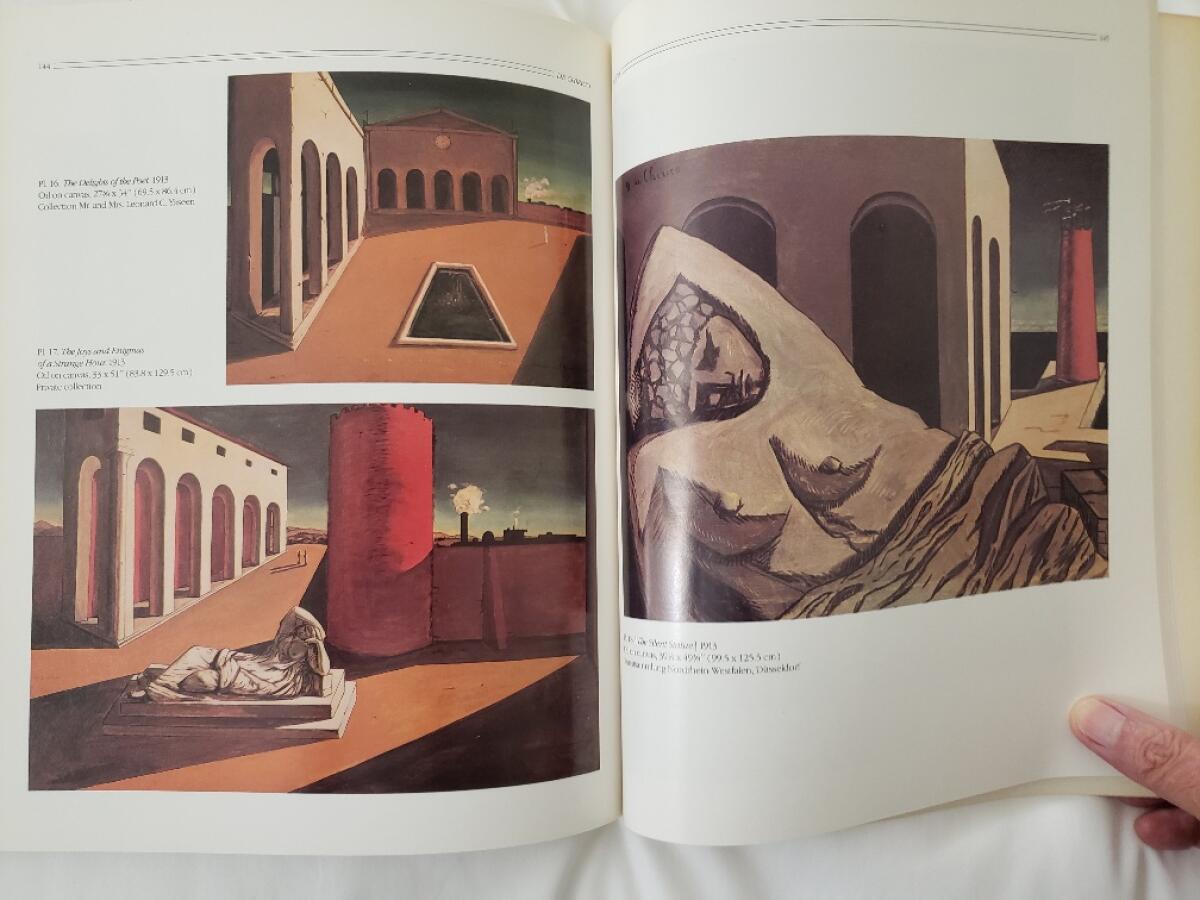
Columnist Mary McNamara tallies up all the ways in which she will make do. It involves books, sketch pads and classical choral music. “Obviously, television and streaming services will play a big part in sanity maintenance during this period of self-isolation,” she writes. As well as lots of soy sauce ramen.
And Times theater critic Charles McNulty, who frequently likes to use his free time to re-read Shakespeare or brush up on other languages, says he is ready to use the time to “do nothing.”
Everything non-corona
Anthony Parthner’s Schreiber S91 Prestige bassoon isn’t worth a lot of money, but the musical director of the San Bernardino Symphony would nonetheless like it back from whoever stole it out of his car, reports Tim Greiving. As far as bassoons go, it’s cheap — Parthner describes it like, “showing up to the Tour de France with a tricycle.” But it was “a very special tricycle,” given to him by his late mother.
Broadway is shut down but you can catch a tribute to one of its most iconic shows on the CW’s musical dramedy “Katy Keene,” a spin-off of “Riverdale.” Jonny Beachamp’s character, Jorge, does bits of “Kiss of the Spider Woman” as his drag alter ego, Ginger. “Anecdotally, I’ve heard that many more high schools put on ‘Carrie’ and ‘Heathers’ after our ‘Riverdale’ episodes aired,” says showrunner Roberto Aguirre-Sacasa. “I’ll be curious to see if there’s a jump in ‘Kiss of the Spider Woman’ after this.”
Seth Rogen gets stoned. Watches the movie “Cats.” And live Tweets. This is all the entertainment I need.
Passages
Merry Norris, the well-dressed powerhouse in a petite frame (she was 5 feet 2), who helped shape the landscape of Los Angeles as a founder of MOCA and in her role as president of the Cultural Affairs Commission in the 1980s, has died at the age of 80. “We build this city building by building,” she told The Times in 1988 of her efforts to upgrade civic design. “Each building is important ... to our thrust to improve the quality of life.”
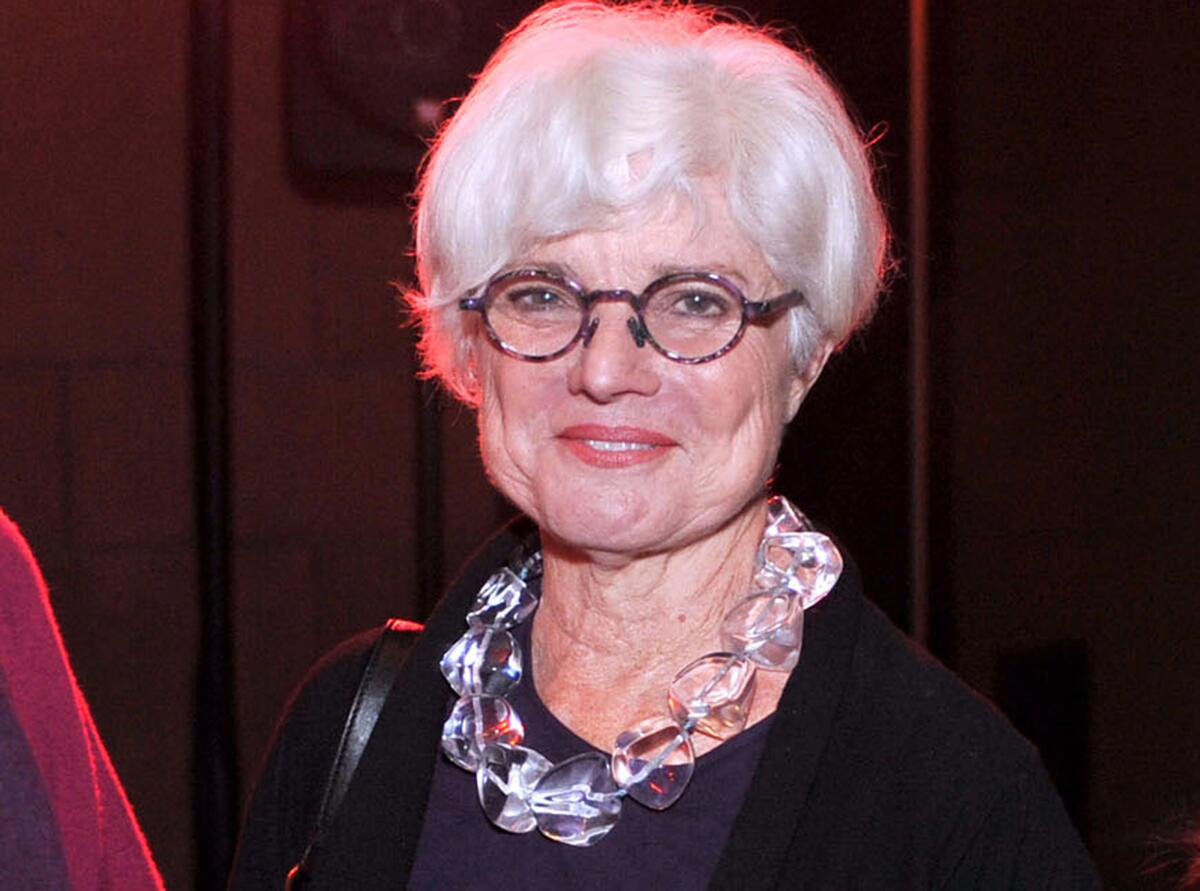
Genesis Breyer P-Orridge, a pioneering industrial musician who founded Throbbing Gristle, and noted conceptual and performance artist who made art of their body through plastic surgery, has died at the age of 70. “It’s just raw material,” P-Orridge told The Times’ Randall Roberts in October of the body. “It’s not sacred.”
Vittorio Gregotti, an Italian modernist known for his monumental projects, such as Barcelona’s Olympic Stadium, has died at the age of 92 in Milan. Gregotti had been infected with the coronavirus. His designs, writes Daniel E. Slotnick, “typically conveyed a sense of grandeur but nevertheless complemented rather than eclipsed their often antique surroundings.”
In the news
— The L.A. Phil’s former associate conductor Mirga Grazinyte-Tyla tests positive for the coronavirus.
— Despite the pandemonium, South Coast Repertory moved ahead with its 2020-21 season announcement, which includes a musical adaptation of “Prelude to a Kiss.”
— In Asia, cultural organizations are beginning to reopen after coronavirus quarantines — albeit cautiously.
— A first look at Steven Spielberg’s “West Side Story.”
— 35 African American artists on the work that inspires them.
— After some back and forth between the Frank Lloyd Wright Foundation and the architecture school that operates in his name at Taliesin West, it looks like the school will indeed be shutting down.
— “...naivete, privilege and all-around crank thinking...” Architecture critic Inga Saffron’s review of the Rem Koolhaas-curated show at the Guggenheim is the best thing I’ve read all week.
— An incredible story of sleuthing: This episode of Reply All is a great listen. (And in no way involves the coronavirus.)
And last but not least ...
Art historical techniques for not touching your face.
The biggest entertainment stories
Get our big stories about Hollywood, film, television, music, arts, culture and more right in your inbox as soon as they publish.
You may occasionally receive promotional content from the Los Angeles Times.




